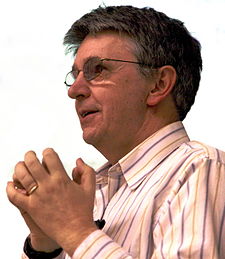László Lovász
| László Lovász | |
|---|---|

László Lovász speaking in 2007 at the EPFL
|
|
| Born | Lovász László March 9, 1948 Budapest, Hungarian Republic |
| Nationality | Hungarian, American |
| Fields | Mathematics, Computer Science |
| Institutions | Eötvös Loránd University, Yale University, Princeton University |
| Alma mater | Eötvös Loránd University, Budapest Hungarian Academy of Sciences |
| Doctoral advisor | Tibor Gallai |
| Doctoral students |
András Frank Tamás Szőnyi Van Vu |
| Notable awards |
Kyoto Prize (2010) Hungary's Széchenyi Grand Prize (2008) Bolyai Prize (2007) John von Neumann Theory Prize (2006) Gödel Prize (2001) Knuth Prize (1999) Wolf Prize (1999) Fulkerson Prize (1982, 2012) Best Information Theory Paper Award (IEEE) (1981) Pólya Prize (SIAM) (1979) |
László Lovász (Hungarian pronunciation: [ˈlaːsloː ˈlovaːs]; born March 9, 1948) is a Hungarian mathematician, best known for his work in combinatorics, for which he was awarded the Wolf Prize and the Knuth Prize in 1999, and the Kyoto Prize in 2010. He is the current president of the Hungarian Academy of Sciences. He served as president of the International Mathematical Union between January 1, 2007 and December 31, 2010.
Lovász was born on March 9, 1948 in the city of Budapest. His father was a surgeon. When Lovász was 14 he found a mathematical article written by Paul Erdős that fascinated him. One year later, he personally acquainted Erdős. They became friends and talked about mathematics and other subjects. This experience greatly inspired Lovász in searching for more knowledge.
In high school, Lovász won gold medals at the International Mathematical Olympiad (in 1964, 1965, 1966 with two special prizes).
Lovász received his Candidate of Sciences (C.Sc.) degree in 1970 at the Hungarian Academy of Sciences. His advisor was Tibor Gallai.
Until 1975, Lovász worked at Eötvös Loránd University, between 1975–1982, he led the Department of Geometry at the University of Szeged. In 1982, he returned to the Eötvös University, where he created the Department of Computer Science. The former and current scientists of the department include György Elekes, András Frank, József Beck, Éva Tardos, András Hajnal, Lajos Pósa, Miklós Simonovits, Tamás Szőnyi.
...
Wikipedia
